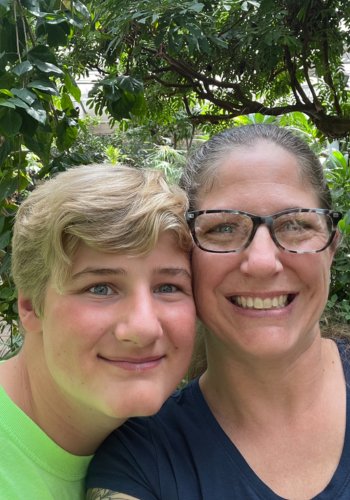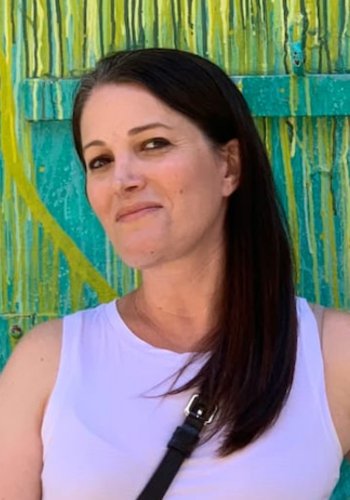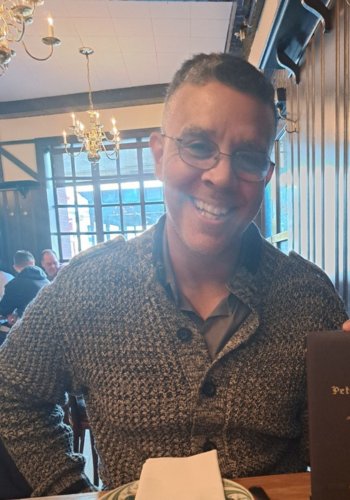Around 1 in 5 adults in the U.S. experience a mental health disorder in a single year, yet many people with these common conditions do not seek professional help. September is National Recovery Month 2024 — a time to honor the resilience of those who have faced mental health and substance use challenges, and to recognize the importance of support systems that help in their journey to wellness. As we reflect on the power of recovery, we want to share inspiring stories from people who have embraced Mental Health First Aid (MHFA) and used their experiences to make a difference.
Brandi Hanes, Youth MHFA
Recovering from Tragic Loss and Advocating for Suicide Prevention

For Brandi Hanes, Recovery Month holds a deeply personal meaning. Brandi’s life was forever changed when she lost her 14-year-old son, Grant, to suicide. Brandi shared, “This was a shock. We had no idea this could happen. Grant was smart and kind and compassionate and funny. He was wise for his age and known by so many as an old soul.” Grant’s unexpected passing left a void, but it also ignited a powerful mission within Brandi.
With over 21 years of experience as a nurse and nurse educator, Brandi decided to pivot her career path to become a special education teacher. Her goal is to work closely with young people, providing them with the encouragement and love that she feels are essential to preventing such tragedies. Her goal is to create a more connected and supportive environment for children, ensuring that mental health is openly discussed and supported.
“Our kids are suffering, silently. Our society has become so disconnected and automated. I became a Mental Health First Aider to help change the course. I want to talk about mental health issues and strongly encourage others to do the same. My son’s legacy will live on by trying to save others from the same fate. In his physical life, he was known for helping others in need and making friends with those that struggled to make friends. I know in my heart that he would want to continue doing this in his new form.”
Laura DeCook, Adult MHFA
Navigating Anxiety and Finding the Right Support

When Laura DeCook was diagnosed with anxiety disorder, she faced a period of intense struggle that led her to seek help. Her early experiences with anxiety and overwhelming pressure highlighted the importance of understanding and addressing mental health.
From a young age, Laura’s anxiety manifested in various ways, including perfectionism. When she began working in the film industry, she was constantly worried about her performance and the possibility of being fired. This anxiety drove her to work excessively long hours, unable to disconnect from work and perpetually checking her email. When her family was going through a difficult personal issue, she tried to speak to her managers and human resources about the depression and anxiety she was dealing with, but she was told that it was not appropriate to talk about these issues in the workplace. This lack of support worsened her frustration with her growing workload.
One day at work, when Laura was called into a meeting about her performance, she felt her heart racing and she started to shake. Overwhelmed, she closed her laptop and went straight to the doctor. Her blood pressure was alarmingly high, and she was diagnosed with anxiety. Her doctor warned that, if she didn’t take mental health leave, she was at risk of a heart attack in her early 30s.
“At that point, I knew I needed to make a change,” Laura said. This was a turning point that led her to discuss her mental health challenges openly with coworkers and friends. She was surprised to learn that many others were struggling with anxiety as well, but they didn’t know how to get help. According to the National Institute of Mental Health, nearly 1 in 5 U.S. adults live with a mental illness, and anxiety disorders are the most common, affecting 19.1% of adults.
Laura reflected, “When one door closes, another opens. If it had not been for this experience, I don’t believe I would have ever ended up finding my true passion and life purpose — working in mental health and substance use awareness.”
In Laura’s next job, she found a supportive mentor who believed in her and helped her create a grassroots mental health program. This led Laura to become a MHFA Instructor and create her own wellbeing company dedicated to helping others recognize the signs and symptoms of mental health and substance use challenges and get appropriate support and treatment, for themselves and others. “It is amazing to see the changes that companies, organizations and universities have been implementing in the last few years to destigmatize the conversation around mental health. My goal is to see Mental Health First Aid taught in schools across the country, as well as have mental health ambassadors in every company so there is always someone who can help others in need.”
Miosotys Santiago, Adult MHFA
Surviving Childhood Trauma and September 11

Miosotys Santiago’s journey to mental wellbeing began at a young age. At 13, she endured traumatic experiences and struggled with severe emotional distress, including a suicide attempt that led to an extended stay in a psychiatric ward. In her adult life, she survived the 9/11 attacks in New York, narrowly escaping Tower One. Despite these challenges, Miosotys found strength through her journey and has come to value the impact of MHFA.
“MHFA could have saved me from much of the pain and grief I endured in my teenage years,” Miosotys reflected. Her experience highlights the critical need for early intervention and the value of having tools to support mental health from a young age.
Ultimately, surviving 9/11 and navigating profound loss and grief led Miosotys to an overwhelming sense of gratitude. “I am thankful for the gift of life, for the privilege of watching my children grow and witnessing the birth of four beautiful grandchildren. Gratitude fills my heart for the friendships I’ve formed, the opportunities I’ve been granted, and the life I’ve built through a long healing journey,” she said.
Becoming certified in Adult Mental Health First Aid was a pivotal moment in Miosotys’ life. It not only rekindled her commitment to her own mental health care but also inspired her to pay it forward by helping others cope with their own circumstances. She is determined to dismantle the stigma surrounding mental health, and create a safe place where individuals can find reassurance without judgment. Miosotys noted that what struck her most about MHFA training was the “profound care” it extends to people living with mental health and substance use challenges. The training taught her how to handle situations and provided insight into mental health challenges – crucial during the post-pandemic era.
“MHFA has significantly influenced my approach to coping with my own post-traumatic stress disorder (PTSD) and depression. I’ve taken accountability for nurturing my mental health, addressing areas of my life that were previously unattended. Through therapy and the MHFA training, I’ve learned to redirect triggers to healthier reactions and navigate both current challenges and unresolved issues from my past,” said Miosotys. Her perspective as a survivor adds a powerful voice to the conversation about mental health and having accessible support systems.
Paul Herbert, Adult MHFA
Advocating for the Voiceless

Paul Herbert’s background in a family with substance use challenges shaped his approach to mental health.
Growing up, Paul felt voiceless and disconnected, but he has since channeled these experiences into a passion for helping others who feel the same way.
“Over the years I have taken MHFA classes to better understand how to help others that may not know how to help themselves,” said Paul.
He is now a peer counselor and Mental Health First Aider and he strives to be a voice for those who may not have one.
Embracing Recovery
Whether through personal loss, overcoming trauma or navigating mental health challenges, First Aiders continue to use their stories and understanding to provide support for others, destigmatize mental health and advocate for change.
As we celebrate Recovery Month, let us honor these stories by continuing to raise awareness, reduce stigma and build a more supportive environment for mental health.
Mental health challenges can affect anyone at any time, whether a close friend, a family member or even yourself. That’s why we are on a mission to give everyone the knowledge and skills needed to recognize signs of mental health challenges, offer support and connect people with appropriate resources on their recovery journeys with MHFA.
- Check out tools and resources from the National Council for Mental Wellbeing to help you better understand recovery.
- Educate and inspire others by sharing your own story of recovery.
- Learn how to better support people in their mental health recovery journey by attending one of our upcoming webinars.
You can #BeTheDifference by joining us in our mission to ensure that mental wellbeing is a reality for everyone.
Sources
- National Institute of Mental Health. (2023, March). Mental illness. https://www.nimh.nih.gov/health/statistics/mental-illness



